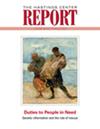在日常生活中发现残疾
IF 2.3
3区 哲学
Q1 ETHICS
引用次数: 0
摘要
这篇评论通过回顾民权运动和人权运动的历史,以及将残疾人确立为一个不受歧视的社会群体并有权要求合理安置的立法的历史,阐释了“残疾”一词的社会和文化作用——这一立法举措将“残疾”从一个主要的医学标签转变为一个社会和政治身份。本文章由计算机程序翻译,如有差异,请以英文原文为准。
Finding Disability in Everyday Life
This commentary explicates the social and cultural work of the word “disability” by reviewing the history of the civil and human rights movements and of legislation establishing people with disabilities as a social group protected from discrimination and entitled to the right to request reasonable accommodations—a legislative initiative that has shifted “disability” from a predominantly medical label to a social and political identity.
求助全文
通过发布文献求助,成功后即可免费获取论文全文。
去求助
来源期刊

Hastings Center Report
医学-卫生保健
CiteScore
3.50
自引率
3.00%
发文量
99
审稿时长
6-12 weeks
期刊介绍:
The Hastings Center Report explores ethical, legal, and social issues in medicine, health care, public health, and the life sciences. Six issues per year offer articles, essays, case studies of bioethical problems, columns on law and policy, caregivers’ stories, peer-reviewed scholarly articles, and book reviews. Authors come from an assortment of professions and academic disciplines and express a range of perspectives and political opinions. The Report’s readership includes physicians, nurses, scholars, administrators, social workers, health lawyers, and others.
 求助内容:
求助内容: 应助结果提醒方式:
应助结果提醒方式:


